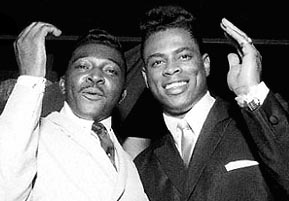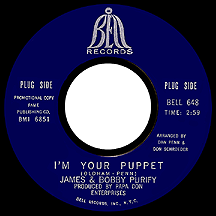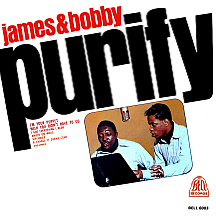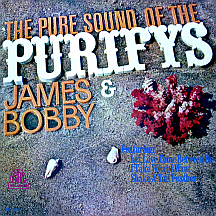JAMES AND BOBBY PURIFY
The 1966 hit "I'm Your Puppet" is the song most people remember James and Bobby Purify for. Memphis-based soul men Sam and Dave are the singers they're too often unfavorably compared to. As a longtime fan of both duos, but with a preference for J&B over S&D, I can tell you Florida's Purify guys ain't no one-hit wonders and never had a reason to feel inferior to the Stax label's Moore and Prater. Also, contrary to the name, they weren't brothers and may not have even been related by blood (a debatable point), which would make them something of an accident in the studio, two potential solo singers come together as one act...and I'm sure glad it happened the way it did!
Robert Dickey was born in Tallahassee, Florida, in 1939, a guitarist who started gigging with bands in and around his home town in the late '50s. Several years later he joined The Dothan Sextet, an established group based in Pensacola, about 200 miles west of the state capital. Sam McClain, the band's lead singer at the time, was a blues-intensive, dynamic personality destined for a limited notoriety as Mighty Sam. Pensacola native James Purify joined the outfit as a backing singer and the band went on a hot streak, attracting crowds from all over the area to the nightclubs where they performed. Local radio personality and record producer "Papa Don" Schroeder heard about Sam from Buzz Cason of Nashville hot rod/surf band Ronny and the Daytonas; he produced a couple of Mighty Sam tracks in early 1966 and convinced Larry Uttal of Bell Records to release them on an Amy label 45, which started a lengthy working relationship between Schroeder and Uttal's Bell family of labels.
By this time Schroeder had logged about seven years on the fringe of the record industry. He'd established himself as a teen ballad singer with "Melanie," recording as Don Schroeder for R&B label Vee-Jay in 1959, an odd fit but a logical one as owners Vivian Carter and James Bracken were just starting to branch out beyond the black marketplace. When that first effort faltered, he got into broadcasting, working as a disc jockey at a station in Knoxville, Tennessee, later moving to the larger Nashville market. But his real goal was to write and produce records. Don worked with up-and-coming country singer Mel Tillis and made more records of his own, staying mostly in the teen vein, as it suited his vocal style; there were two singles on Philips (in 1962), one on Sound Stage 7 (in '63) and, soon after, "I'm Hurtin'" on the R and H label, his first outing at the FAME studio (founded by Rick Hall in 1959) in Muscle Shoals, Alabama.
Papa Don hardly seemed like the type of guy who would go on to produce some of the best rhythm and blues discs of the late '60s, but the southern soul scene was where his head was at. He moved back home to Pensacola in 1961 and became a popular personality at WBSR, later promoting live shows starring the hottest acts of the day including James Brown and Wilson Pickett. Mighty Sam had suggested he check out the Dothan Sextet and he was impressed by Purify, who'd taken over as lead singer, and felt even more strongly about guitarist-singer Dickey. Contracts were offered to both, the plan being to record them as separate solo acts. Muscle Shoals, a few hundred miles north of Gulf city Pensacola, was the designated meeting place.
Singer-songwriter Dan Penn had been making records (sometimes using the name Lonnie Ray) for a few years; in late '65 he recorded "I'm Your Puppet" for MGM Records, a song he and Dewey Lindon Oldham (who prefers to be called "Spooner") had written concerning the well-worn theme of a man's obedience to a woman ('Darling, you've got full control...'). During a session at FAME, Papa Don suggested it to Dickey, who'd been hoping for something he could sink his teeth into; Purify, five years younger than Dickey, was in the studio and the two worked up a duet with a lead by James and harmony by Robert. Astonished by the result, Schroeder sold the master to Larry Uttal, coming up with the act's name, James and Bobby Purify, on the spot. Uttal agreed to release it on the Bell label based in part on the cool, unusual name.
"I'm Your Puppet" developed quickly and reached the national top ten in November '66, complementing its pop success with a couple of weeks at number one on the Cash Box rhythm and blues charts. "Wish You Didn't Have To Go," a song Oldham had recorded for Fame in '64 as Spooner and the Spoons, received a bouncy Purify treatment and made the top 40 in February 1967. Schoeder chose the next A side, "Shake a Tail Feather," a favorite since '63 when he first heard The Five Du-Tones' hit version; James and Bobby laid down the basic track (in mono) at "Chips" Moman's American Sound Studio in Memphis, then Schroeder took the mono master to New York and added backing vocals (in stereo) by Melba Moore, Doris Troy and Ellie Greenwich, loosely creating a party atmosphere. The singers nearly everyone assumed were brothers (the album's liner notes said so!) had their third hit in a row.
Comparisons to established soul duos started to swirl; not just Sam and Dave but Joe and Eddie, Sam and Bill and others were considered by critics as forerunners; if indeed the Purifys sounded similar to anyone it would be The Sims Twins (brothers Bobby and Kenny), an act discovered by Sam Cooke, who'd penned their 1961 hit, "Soothe Me." James and Bobby have both mentioned Cooke as a major influence, so the Sims connection is an easy one; a remake of the song on the second J&B album, The Pure Sound of the Purifys, has a near-identical arrangement. The supposed rivalry with the more energetic Sam and Dave, fueled in part by Schroeder's switch to Memphis for recording the Purifys, thus geographically placing them within five miles of the Stax studio, would seem to have hit its zenith in early '67 when both acts landed Grammy Award nominations, competing in the same category (Best Rhythm and Blues Group Performance) for their breakthrough singles (S&D's "Hold On! I'm a Comin'" versus J&B's "I'm Your Puppet"); in one of Grammy's many bewildering, category-bending oddities, they both lost to an instrumental album cut by Ramsey Lewis, "Hold it Right There."
James and Bobby scored hit number four, the in-your-face "I Take What I Want," an Isaac Hayes-Mabon Hodges-David Porter song recorded by Sam and Dave nearly two years earlier; in addition to a couple of S&D originals on J&B's self-titled debut LP, this made the perception some had that they were second-rate imitators all the more pointed. Any rivalry there may have been was friendly...and certainly held no consequence after "Soul Man" provided a massive boost for Sam and Dave when it blew up a few months later.

"Let Love Come Between Us," a fall 1966 pop-rock song by The Rubber Band (it was composed by group members Joe Sobotka and John Wyker) turned out to be the second biggest hit for the Purifys, whose remake a year later retained much of the original's pop feel. Pure Sound wasn't entirely derivative, as it contained material by Oldham, Penn and/or Schroeder that hadn't previously been exposed. One of the album's remakes took an intriguing path: "You Don't Love Me," a scorching but underrated tune introduced several years earlier by its author, bluesman Willie Cobb, became much more popular after Jamaican Dawn Penn slowed the song down, reggae-style, in 1968 (about a year after the Purify version), and ultimately got the most mileage out of it.
In early 1968, "Do Unto Me" became the sixth consecutive chart single, a strong effort written by Gary Illingworth, Richard Grasso and Roulette executive Morris Levy. "I Can Remember," a softer-than-usual Purify track penned by Illingworth and Grasso with Myrna March, fared only slightly better during the spring of '68, resulting in an unfortunate lack of exposure for one of the year's best singles; this was the song that piqued my interest in the Purifys and motivated me to get all their earlier records. Other music acts recognized its brilliance and attempted to make it the major hit it should have been. Pop singer Doc Galvez covered it on Scepter right after the J&B single charted, it was Peter and Gordon's final Capitol single in 1969 and Oliver took a mildly successful stab at it in 1970. James and Bobby's original trumps them all and should have been a much bigger hit.
"Help Yourself (To All of My Lovin')" appeared as a Jay and the Techniques B side a few months before James and Bobby Purify tackled the tune and managed a brief low-chart showing with it. There were two singles in 1969: "Untie Me" (the breakthrough '62 hit for R&B group The Tams) came from the pen of Joe South, who was clicking at the time with his own hit, "Games People Play." Papa Don and FAME regular Jesse Boyce came up with "I Don't Know What it is You Got," a smoking track that was the final Purify release on Bell...and Bobby's last, period. By that time, radio stations in my neck of the west coast had stopped playing current songs by J&B and for a little while I was unaware of these 45-only treats, but through diligence and perusal of the ever-useful Phonolog I became aware of the final three singles and special-ordered them from my favorite record shop, where I later worked part time. I kept an eye out for another album that would include (hopefully in stereo) the last ten singles sides, but it never materialized (to this day, some of the tracks remain available only in mono).
Don Schroeder and the often-unreliable James Purify had a falling out in 1969. Papa Don Productions went into limbo for the time being as Schroeder followed other business ventures. Robert Dickey left the music business behind and moved back to Pensacola while James continued performing, though he didn't make any records for about five years. In 1974, Papa Don made a splashy return to record production with Carl Carlton's Purifyesque hit "Everlasting Love" and, at about the same time, he reunited with James, who convinced him he'd cleaned up his act. With Dickey no longer interested, Don paired James with a new partner, Ben Moore, who'd broken into the business as half of the duo Ben and Spence; "Woman, Hang Your Head in Shame," recorded at the FAME studio, had been issued on Bell in '66 just as the Purifys were hitting with "Puppet," but its failure led to a dry period for Ben and Spence until, about a year later, Atlantic Records took a chance with two singles that, likewise, went nowhere (this was, I'm afraid, no reflection on the quality of the work).
Ben became the "new" Bobby Purify and few noticed. I was a bit baffled at the difference in Bobby's appearance on the cover of their Casablanca album You and Me Together Forever (a wildly inaccurate title, as it turned out) but didn't question it. Paying yet another tribute to the music of Stax Records, a funky Purify version of Isaac Hayes' 1972 Shaft hit, "Do Your Thing," had a respectable Soul (formerly R&B) chart run in late '74 and early '75 (though I've often wondered if they would have had more luck promoting the flip side, the terrific Bobby Emmons tune "Why Love," instead of a reworking, however well-done, of an established recent hit).
Papa Don Schroeder produced the mock-brother act right to the end; the 1976 album The Purify Bros., on Mercury, achieved unexpected success in the U.K. when a remade "I'm Your Puppet" (with strings this time) became a hit in that country (the original, and all other Purify records, had somehow been passed over). While Americans largely ignored the album, British fans spurred a mini-phenomenon for James and "Bobby" (Ben) Purify; their solid interpretation of Mac Gayden's "Morning Glory" also hit the U.K. top 40 that year. Several singles received simultaneous releases there and in the U.S., culminating in Paul Jabara's "Slow Dancing." The only record actually credited to the Purify Bros., this non-album 1977 track was the duo's swan song.
Several years after J&B's late-'60s peak, I made the acquaintance of James's mother, Nellie B. Purify (don't ask what a teenager from L.A. was doing in Pensacola, Florida...but I was there). I asked her if she was related to James and Bobby and she replied, "They're my sons." That, as I later discovered, was only a half-truth (good thing I wasn't researching a story on them at the time or I would have been seriously misled!), but who's quibbling? She put me in touch with James Purify (the one that was really her son), and we had a nice telephone conversation (though I never met him in person). He told me the duo was working on a comeback, which turned out to be the '74 Casablanca album (he omitted one minor detail, that Bobby was out and Ben was in). I've since come to realize that Nellie and James were probably asked personal questions on a regular basis and found it easier to generalize than try to explain to fleeting acquaintances the complicated details (minor things, like the so-called brothers weren't necessarily related or that one of them had long since left the act).
Of the three Purify "brothers," Ben Moore had the longest career. He and James split up in 1978, after which he went through several musical phases using his real name. A soul/disco album, Purified, under the proud banner "A Papa Don Production," appeared in England in 1979 on the DGM label and in the U.S. on Roadshow under the title Slow Dancin' (the title track, "Slow Dancing," isn't the earlier Purify song but a remake of the 1976 hit by The Funky Kings that was a million seller for Johnny Rivers in '77). A gospel album, also titled Purified, appeared in 1982 on the Priority label and garnered a Grammy nomination for Ben in the category of Best Soul Gospel Performance, Traditional, for the song "He Believes In Me." In 2005, his eyesight gone by that time, he entered the studio with longtime associates Dan Penn and Spooner Oldham (and other top-notch musicians) and, reviving the name Bobby Purify, recorded the critically praised album Better to Have It.
NOTABLE SINGLES:
- I'm Your Puppet - 1966
- Wish You Didn't Have To Go /
You Can't Keep a Good Man Down - 1967 - Shake a Tail Feather - 1967
- I Take What I Want - 1967
- Let Love Come Between Us - 1967
- Do Unto Me - 1968
- I Can Remember - 1968
- Help Yourself (To All of My Lovin') - 1968
- Untie Me - 1969
- I Don't Know What it is You Got - 1969
- Do Your Thing - 1974
- Why Love - 1975
- I'm Your Puppet - 1976
- Morning Glory - 1976
- Slow Dancing - 1977
as Purify Bros.




